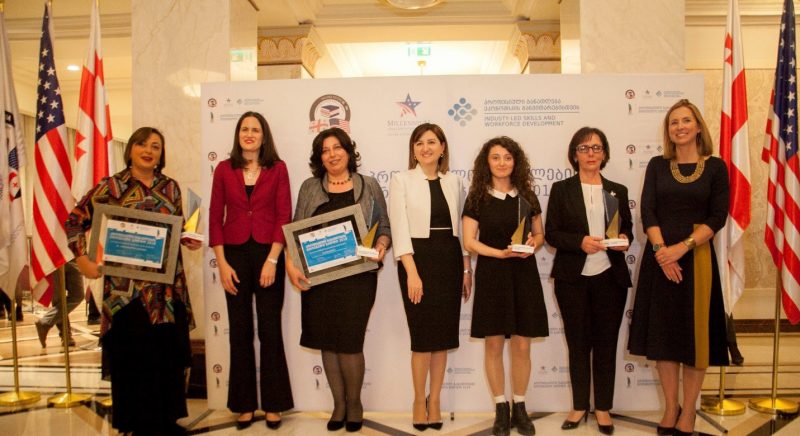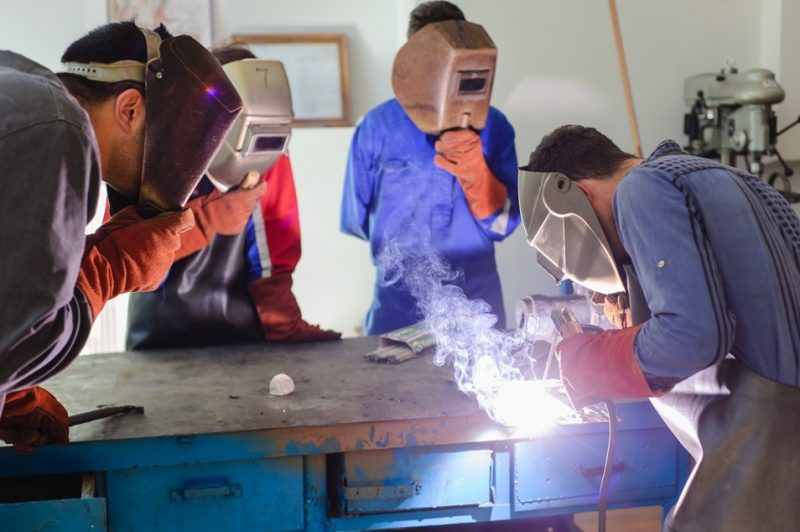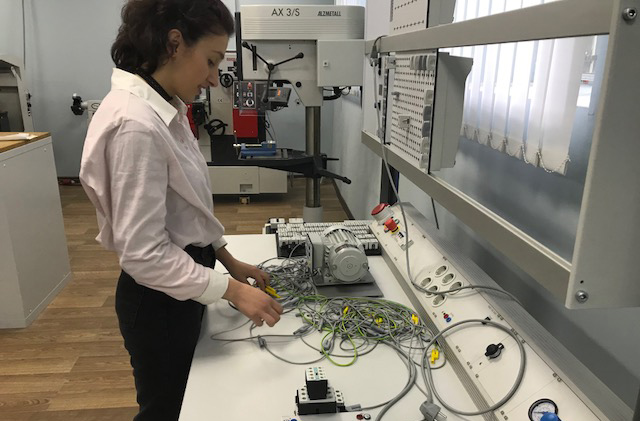
MCA-Georgia
MCC Deputy Vice President Lona Stoll, second from left, with the TVET annual award winners in Tbilisi, Georgia.
This week we are celebrating International Education Week by highlighting some of MCC’s efforts to boost education in our partner countries. Education plays an essential role in our mission to reduce poverty through economic growth, and many of our compacts seek to transform human capital development in our partner countries to set them on a path to greater prosperity.
Educational institutions do not always operate in tandem with the demands of businesses, meaning students do not develop the skills they need to earn enough income to lift themselves and their families out of poverty. To remedy that, MCC supports partner countries in developing Technical Vocational Education and Training (TVET) programs that bring the private sector directly in partnership with government and training institutions.
Nothing exemplifies MCC’s work to align education with the needs of industry better than our second compact with the Government of Georgia, which is entirely focused on transforming the country’s education sector into a modern system that works to give Georgians what they need to earn higher incomes and improve their quality of life. Moreover, our programs emphasize the economic empowerment of women, so each of the programs we fund seeks out opportunities for women to thrive, because no nation or economy can reach its full potential if half of the population is not engaged and empowered.
Last week, I traveled to Tbilisi to participate in MCC’s Industry-Led Skills and Workforce Development (ISWD) Project-supported TVET Annual Conference and “Week of Skills,” which brought together key TVET stakeholders to share international best practices, demonstrate new opportunities created under the ISWD Project and promote TVET among Georgian society. Showing Georgian youth what these technical skills can provide them in terms of opportunities and higher income is a critical part of the transformation, and the passion of instructors, rectors and students was evident throughout the week. I am particularly proud that the annual winners this year were all women, including Ia Mosashvili, a digital electronics instructor at the compact-funded Georgian Technical Training Center who was named “TVET Professional of the Year.”
MCC has funded 10 TVET providers that have put in place more than 50 demand-driven programs and enrolled 1,200 students. Each program has attracted significant co-financing support from the private sector, the public sector or sometimes both, because the programs are training their future workforce. These public-private partnerships are boosting the impact of TVET programs in the country and reshaping the way Georgia develops human capital. I want to share a brief look at two of the TVET programs I visited last week.
Batumi State Maritime Academy

MCA-Georgia
Students at the Batumi State Maritime Academy get hands-on training in welding.
The maritime industry plays an increasingly important role in Georgia’s economy, but the country’s institutions have not been producing enough qualified workers to keep up with demand. Under an MCC grant, the Batumi State Maritime Academy (BSMA) is offering seven programs and four certificate courses in welding, fishing vessel navigation, port logistics management, cargo handling logistics and crane operation. The $1,373,735 grant under the compact has attracted an additional $287,300 in co-funding from the Ministry of Economy and Sustainable Development. Eighty-five students are currently registered in compact-funded programs and certificate courses, and 145 students have already graduated.
When I visited during the “Open Door” day, more than 100 high school girls and boys were touring the Academy, and watching welding students use virtual reality simulators made in Ohio. I am particularly proud of the nine women who graduated from the port logistics management program, who are leaders in changing the perceptions of women in maritime fields.
Georgian Technical Training Center

Tamuna Lekveishvili, above, studies high-voltage electrical engineering at the Georgia Technical Training Center.
The Georgian Technical Training Center (GTTC) is training technicians in mechanical engineering, industrial automation, and mechatronics, as well as training manufacturing supervisors. Graduates of the program will leave GTTC with quality training and a skillset that will immediately benefit the growing industrial sector across Georgia.
MCC’s $2,362,910 investment is matched by $3,199,879 in co-funding from British Petroleum (BP). The funds were used to construct a state of the art training facility with modern laboratory equipment and workshops, train instructors, develop the new curricula, and introduce an innovative e-learning center.
After graduating with her B.A. in May of 2018, Tamuna Lekveishvili applied for Georgian Technical University’s one year high-voltage electrical engineering program. After three months of classroom education, the program provides its students with three months of hands-on practice before pairing them with internships in the field.
Tamuna’s internship is in the Development Department at Ecopre, a water and wastewater treatment company. She assists her team in identifying the electrical needs of Georgians across the country, and determines the tools and processes required to increase citizens’ access to consistent sources of electricity.
Tamuna firmly believes that the power and energy sectors in Georgia can and will play a large part in development moving forward, and she is excited to play an important role in Georgia’s future herself as a high-voltage electrical engineer. Her enthusiasm gives me great hope for the future of this country, and for the role that women will play in driving innovation and economic progress.
Visiting GTTC during their “Open Door” day, I was thrilled to see first-hand the wonderful cooperation between Georgian Technical University and international private sector partners like BP and to officially inaugurate a new facility funded by this partnership.
TVET students like Tamuna and others, such as the high school students touring the centers on “Open Door” days, represent the new opportunities Georgians now have to tap into growth sectors in their nation’s economy. The next generation of Georgians will enter the workforce with the skills and training they need to boost economic growth, reduce poverty and create a more prosperous and stable country, and I am proud of the work MCC is doing with the Government of Georgia to make that happen.

